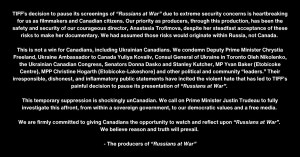UPDATED with producers’ response: The Toronto Film Festival said Thursday that it has paused upcoming screenings of Russian-Canadian director Anastasia Trofimova’s documentary Russians at War “effective immediately” after learning about “significant threats to festival operations and public safety.”
“While we stand firm on our statement shared yesterday, this decision has been made in order to ensure the safety of all festival guests, staff, and volunteers,” TIFF said in a statement today, adding, “This is an unprecedented move for TIFF.”
Russians at War provides a rare insight into life for Russian soldiers on the frontline in Ukraine. Trofimova embedded herself under the radar with Russian troops after making the connection via a soldier she met on a train as he returned home briefly from the front to visit his family. Her aim, she said, was not to glorify the Russian troops, but rather to get to the bottom of what as happening on the frontline. Russians at War also played out of competition in Venice.
The doc, playing in the festival’s TIFF Docs sidebar, had been schedule to screen Friday, Saturday and Sunday at Toronto’s Scotiabank Theatre before today’s news.
TIFF had faced public pressure in Canada to not host the North American premiere of the movie, which was funded in part by federal and provincial Canadian agencies. It sparked criticism from politicians including from Deputy Prime Minister Chrystia Freeland who claimed it was sympathetic to the Russian side and could be viewed as pro-Russian propaganda.
Russians at War is produced by respected documentary producers Sally Blake and Philippe Levasseur at Paris-based Capa Presse, and Canada’s Cornelia Principe, who scored an Oscar nomination last year for To Kill a Tiger.
The producers released a statement later today after TIFF’s decision was announced. In it, they condemned political and community leaders whose “irresponsible, dishonest and inflammatory public statements have incited the violent hate that has led to TIFF’s painful decision to pause its presentation of Russians at War.”
They called on Canada Prime Minister Justin Trudeau to “fully investigate this affront.”
TIFF, meanwhile, added today that “This has been an incredibly difficult decision. When we select films, we’re guided by TIFF’s Mission, our Values, and our programming principles. We believe this film has earned a place in our Festival’s lineup, and we are committed to screening it when it is safe to do so.”
The day before, TIFF said in support of the film that “As a cultural institution, we stand for the right of artists and cultural workers to express fair political comment freely and oppose censorship. Because filmmakers, like all artists, work in dynamic engagement with their societies, we believe that our role as curators and presenters of film must stand for an unequivocal defense of artistic expression, and a commitment to provide safe, open spaces to engage, critique and reflect on artists’ work.”
At the Venice presser for the movie, the filmmaker was asked if it was ethical to “humanize” Russian soldiers in light of war crimes committed by the country’s army during its ongoing invasion of Ukraine.
“I find it a little bit of a strange question, if we can humanize or not humanize someone. So, are there lists of people who we can humanize and people who we can’t? Of course, we have to humanize everyone. This is a huge tragedy for our region, first of all, and for the entire world,” replied Trofimova.
“If we don’t see each other as people… these black and white stereotypes about each other, this will only make the war continue. This will only make the hatred grow… unfortunately, that’s sort of the route taken by politicians, but I don’t think that this is the route that regular people should take.”

